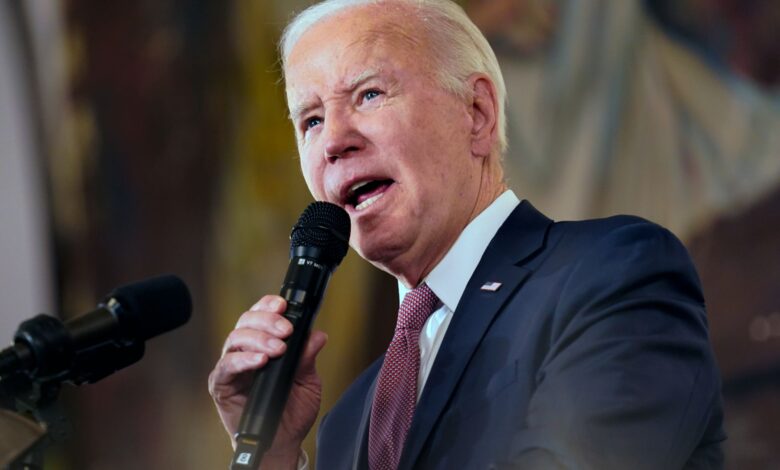With Tehran closer to nukes, Congress must end Biden’s Iran appeasement before it’s too late

President Biden’s three years of appeasing Iran has brought the world’s leading state sponsor of terrorism closer than ever to developing a nuclear weapon.
While most Americans were on winter break, the United Nations’ nuclear watchdog reported that Iran had tripled its production rate of near-weapons-grade nuclear fuel — 60%-high-enriched uranium — with a stockpile large enough to potentially produce one nuclear bomb in a week or six bombs in a month.
On Monday, former UN weapons inspector David Albright assessed Tehran could build a few crude weapons to marry with this nuclear material, mostly in secret, in just six months.
How did we get here?
By the end of 2020, Iran was down to just $4 billion in accessible foreign-exchange reserves due to the Trump administration’s imposition of maximum economic pressure on Tehran.
The regime’s terror mastermind, Quds Force Commander Qassem Soleimani, had been killed in a US drone strike.
The godfather of its nuclear-weapons program, Mohsen Fakhrizadeh, had been assassinated (likely by Israel).
Nuclear-weapons scientists were being put on US sanctions lists while the president spoke openly about considering military strikes inside Iran.
Tehran’s nuclear-escalation curve had been flattened for months.
But Biden and his closest aides, like horses wearing ideological blinders, could not accept a strategy that was successfully containing, if not destabilizing, one of America’s greatest adversaries.
Biden pledged to restore the Obama-era Iran nuclear deal that effectively offered Tehran hundreds of billions of dollars to merely delay its nuclear breakout by a few years.
The deal’s supporters argue the nuclear crisis at hand exists only because Donald Trump pulled America out of the agreement in 2018.
But the record shows that every major escalation in Iran’s nuclear program started in 2021: jumping from low-enriched uranium production to 20% enrichment; jumping from 20% enrichment to 60%; producing uranium metal, which is a key component in nuclear weapons; denying UN inspectors access to an advanced-centrifuge manufacturing plant; ending cooperation with a probe into four undeclared nuclear sites; expanding construction of a potentially impenetrable underground nuclear facility; harassing inspectors and denying their visas.
Any one of these escalations should have prompted Biden to restore pressure on Tehran and ensure the mullahs feared a potential military strike.
That the White House responded to the totality of them with continued offers of sanctions relief defies belief.
Nothing has been able to disabuse Biden of his almost-religious commitment to appeasement as the only viable path to containing Iran’s myriad threats.
Not the selection of Ebrahim Raisi, the so-called hangman of Tehran, as Iran’s president.
Not the transfer of drones to Russia for use against Ukraine.
Not the daily crimes committed against Iranian women, which prompted a national uprising to bring down the regime.
Not the largest massacre of Jews since the Holocaust.
Not even assassination plots targeting former US officials, attempts to kidnap Iranian Americans from US soil, Iran-directed attacks on US troops in Iraq and Syria, injuring dozens of servicemembers — one critically — or the suicide-drone attacks on US destroyers in the Red Sea.
It should terrify every American that as the sands of nuclear time slip by, the Biden administration’s Iran policy remains as it was on Jan. 20, 2021.
Two weeks after the International Atomic Energy Agency’s startling report, there has been no American call for an emergency board meeting to censure Iran and refer its file to the UN Security Council.
Two months after the expiration of a UN missile embargo, with news that Russia may soon import Iranian ballistic missiles for use against Ukraine, there has been no American initiative to restore all international restrictions on Iran — a process that merely requires sending a letter to the Security Council.
Most concerning, Tehran today fears no threat of military force against its nuclear sites.
Washington appears helpless in the face of Iran-backed Houthis firing missiles at ships in the Red Sea, while the secretary of state tours the Middle East telling allies he’s doing everything possible to avoid a confrontation with Iran.
Instead, a State Department sanctions waiver remains in effect, issued after the Oct. 7 Iran-backed Hamas massacre, to give Iran access to $10 billion.
Further, China keeps importing Iranian oil with no attempt by the White House to enforce US sanctions.
Clearly, the ayatollah sees a green light both to expand his ring of fire around Israel and to move closer and closer to a nuclear-weapons capability.
Congress has a duty to intervene.
The House has already passed bills to shut down the $10 billion for Iran, crack down on Chinese imports of Iranian oil and impose sanctions on Iran’s leaders for their abuse of women.
Senate Republicans should mount a pressure campaign on Senate leader Chuck Schumer to vote on all three measures.
Members of both parties in both chambers should also push the White House to ensure America’s military option remains credible and at the ready.
Biden’s Iran strategy of appeasement has failed.
America must course-correct quickly to stop the emergence of a nuclear-armed Iran.
Richard Goldberg, a senior adviser at the Foundation for Defense of Democracies, is a former National Security Council official and senior US Senate aide.




